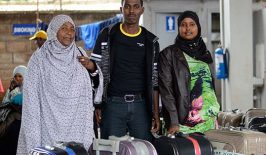According to figures from the UN High Commissioner for Refugees (UNHCR), over 51 million people are currently seeking asylum, have refugee status or are internally displaced. As a result of natural and humanitarian disasters, this number is growing. Over the next week, we pose the question ‘how does refugee aid look in the digital age’ and, via our RESET Special ‘Refugee Aid 2.0’, we will introduce projects that use digital tools to support and assist refugees. Today: how gaming is being used to challenge attitudes about asylum seekers.
It seems that not a day goes by when refugees or asylum seekers are not in the news. Yet, a lot of the time, the facts can get mixed up in rhetoric and skewed as various political actors debate what to do with new migrants. Tensions play out not just in the political arena but in our communities and on our streets. Stereotypes and ignorance about foreign cultures and people pose not just a danger to social cohesion and peaceful living in our neighbourhood, but are a threat to the long-term sustainability of increasingly multicultural cities in a globalised world.
Studies have shown that prejudice against refugees and asylum seekers can be borne out of lack of information and awareness about their situations. A 2009 study by the Red Cross in the UK showed a significant gap in the perception of how many asylum seekers people believe enter the UK compared with how many actually do. Negative attitudes towards asylum seekers were found to be particularly prevalent among people aged 18-24, who frequently used the words ‘hostile’ and ‘uneducated’ to describe asylum seekers.
A Playful Approach to Dealing with Heavy Topics
Any efforts to deconstruct myths, inform, engage and educate are therefore key in promoting greater understanding and tolerance within diverse communities, and to ensure equal opportunities for all. To help break down prejudicial barriers against refugees and asylum seekers, particularly among younger people, a number of organisations are using gamification, whereby gaming design and principles are put to use to engage people in certain topics.
Through the use of games in non-game contexts, users are informed, educated, challenged and, hopefully, motivated by what they have learned. Gamification is already being used to engage people in topics such as peacebuilding, healthcare, farming, education, animal welfare and disaster management. Now its potential to bridge knowledge gaps surrounding refugees and asylum seekers is being seized upon, with the three following games setting out to do just that.
In ‘Play against all odds’, developed by the UNHCR, participants go through the journey of a would be asylum-seeker and experience the issues and the emotions that arise from the minute they realise that they are no longer safe in their own country. The platform provides not just a simulation of real-life situations such as interrogations, and escape journeys, but also testimonials from refugees all around the world. Also, the all-important distinction between refugees, asylum seekers and migrants is made and the platform provides much-needed positive refugee stories, including interviews with famous people. It is therefore a great source of information and an educational resource for teachers.
In ‘Asylum: Exit Australia’ (depicted in the video above), developed by Australian national broadcaster SBS, Australia suddenly turns into a politically unstable country, in which certain groups no longer feel safe. Many are seeking to leave. Players are taken through some of the real-life scenarios they would be likely to face in their attempt to flee the country, such as passport applications at embassies and conversations with community support organisations in assessing what options might be available under various economic circumstances. Encounters with strangers on the streets, or people looking to exploit those seeking to flee, are also enacted. The issue of exploitative practices towards people fleeing their homes is really brought home by the game, with people smugglers or dodgy employers looking to cash in on people’s vulnerability. As the simulation progresses, the player has to deal with increasingly threatening and violent behaviour from ordinary people-turned-vigilantes.
In ‘My life as a refugee’, also by the UNHCR, players select one of three characters each with distinct situations and problems: Merita is 27 years old, married and expecting her third child when civil war erupts; Paulo is 15, dreams of becoming a doctor and is at risk of becoming a child soldier; Amika is 24, a mother of two, and in danger as she starts speaking out when a friend is raped. Each is suddenly forced to leave their family and attempts to flee their country. In their quest for their characters’ safety, players are confronted with a number of tough decisions and challenging events. How the game ends and what the outcome of each story is will vary depending on the decisions players take along their journey, highlighting how precarious and uncertain the future of a refugee can be.
The BBC also recently released a short game online where players must flee Syria and make a series of decisions about how to safely make it to a refugee camp in another country.
The goal of these games is to drive attitudinal change by placing non-refugees into simulated situations that many displaced persons face. While maximising the reach of these games is a challenge, through gamification, the three initiatives above do make the issues around refugees and asylum seeking more accessible. The potential for games to engage, inform and challenge preconceptions is being actively tapped into. Against a backdrop of often negative and divisive information on such issues, these games offer a more constructive narrative, and can be an empowering tool for both the communities they represent as well as the players.



